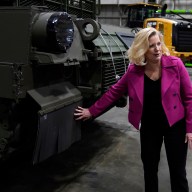DUBAI, United Arab Emirates – In a speech to officially begin his second term, President Mahmoud Ahmadinejad gave what amounted to the regime’s official world view: Iran deserves respect as a globe-shaping power and can withstand any pressures the West can apply.
But what he left out last week were any hints of how Iran’s global strategies will cope with the backlash from the internal political tempests – which has left Ahmadinejad hobbled, the ruling theocracy feeling uncomfortably challenged and opposition groups digging in for a long battle.
Few expect Iran to significantly retool its foreign policies in the aftermath of the disputed June 12 elections. But experts say the country will be closely watched for telltale signs of shifts, including whether Ahmadinejad adopts less confrontational tones in international affairs and Iran tries to buy time on Washington’s seize-the-moment offer to open talks.
Ahmadinejad plans to be on President Barack Obama’s home turf next month for the U.N. General Assembly – possibly his first major international trip since the election.
He may still carry the outward swagger as in his past annual stops in New York. This time, though, he also will likely try for damage control to his image.
“The Iranian leaders are all checking their wounds,” said Abdulkhaleq Abdulla, a professor of political science at Emirates University.
Certainly Ahmadinejad has been left bruised and diminished after the election, which millions claim he stole through clumsily rigged results. Even some conservatives are turning their backs over his apparent support for a merciless crush-or-be-crushed strategy against the opposition.
But Ahmadinejad has pushed back rather than retreat.
On Sunday, he ousted four more senior Intelligence Ministry officials in an ongoing purge of those perceived as failing his allegiance test. The move further cements his control over Iran’s main spy agency – a vital tool in battling dissent – and also provides a possible character study for the bumpy times ahead.
Ahmadinejad has shown no hesitation to flex his authoritarian clout in the early moments of his second term. The pretext of an ongoing political crisis could give him even more room to test his limits – along with his powerful backers in the Revolutionary Guard.
Yet they must be careful for the time being. Overstepping the line leads in only one direction: a direct confrontation with Iran’s Supreme Leader Ayatollah Ali Khamenei and the theocracy he controls.
So far, Khamenei has publicly stood by Ahmadinejad through Iran’s worst internal upheavals since the 1979 Islamic Revolution. There’s been some hints of friction, including Khamenei showing a noticeably restrained embrace of Ahmadinejad during a ceremony last week to formally endorse the election results.
But the Islamic leadership is looking bigger and longer term – essentially assessing the Islamic system for structural damage. The theocrats’ top concern is existential: Whether the high-level rifts opened by the election and the stormy fallout could threaten their very survival.
“What we have is a situation that Iran’s rulers have never faced before,” said Kaveh Afrasiabi, a U.S.-based author and scholar of Iranian affairs. “No one knows how to predict what will happen because it’s all new ground.”
September offers the chance for some guideposts.
The U.N. assembly dovetails with Obama’s loose deadline for Iran to show willingness to reach across a nearly 30-year-old diplomatic no man’s land. The talks proposed by Obama would include the most pressing subject: Iran’s nuclear program and its demands to handle its own uranium enrichment.
Iran insists it seeks only nuclear energy, but the United States, Israel and others worry it also could seek atomic weapons.
Iran also come could under further squeeze by the Group of 20 summit in Pittsburgh on Sept. 24-25, which is expected to have Iran on the agenda. At the same time, Ahmadinejad’s second-term Cabinet will be getting its bearings – possibly with a new foreign minister and top advisers. Ahmadinejad is expected to announce his new government next week.
“The Iranian government will be consumed by internal difficulties for some time to come,” said Nicholas Burns, a professor at Harvard’s Kennedy School of Government and a former senior official at the State Department.
But that doesn’t necessarily mean Iran will only be looking inward despite accusations of “enemy” plots and a revival of attacks on old nemesis Britain and other European nations.
“Ahmadinejad might very well look for a foreign policy opportunity or crisis to district the Iranian population and to attempt to repair his tattered international image,” said Burns.
John Bolton, a former U.S. ambassador to the United Nations, also believes Iran’s leadership may make some stab at talks in an international forum or even some cautious overtures to Washington.
“It buys them time,” he said.
It also offers a buffer against demands to pull back the open hand.
“Iran can leave open room for diplomacy and deflect arguments for harsher measures such as additional sanctions or, even worse, military action,” said Bolton, now a senior fellow at the American Enterprise Institute in Washington.
There is only so much time to make something happen, though. Secretary of State Hillary Rodham Clinton acknowledged Sunday that U.S. envoys would have to deal with Ahmadinejad despite the deep questions about his landslide re-election. Yet she added: “We’re not going to keep the window open forever.”
There is one inconvenient reality, however, that’s often left out of the Western rhetoric on Iran. Ahmadinejad may be loathed by many opponents for what they consider grand theft of the country’s dignity and spirit. Still, he strikes a chord of unity when he talks about Iran’s rights for a nuclear program.
There’s widespread support across Iran for homegrown nuclear technology, including uranium enrichment, as a point of national pride. Ahmadinejad knows this and uses it often. His inauguration speech last week included words intended for the rapidly shrinking common ground.
–
Associated Press Writers Vladimir Isachenkov in Moscow and Christopher Bodeen in Beijing contributed to this report.
















